EU BRICC graduates 5,000 youth in Yobe state from vocational skills training
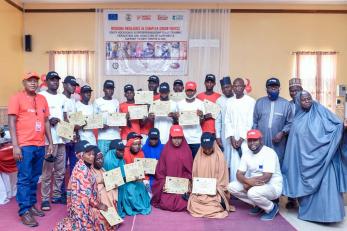
In a landmark achievement for the European Union-funded Building Resilience in Complex Crisis (BRICC) program in Yobe state, Mercy Corps is graduating 5,000 youths from its youth vocational skills training. The purpose of the intervention was to ensure that 5,000 youths, aged 18 to 24 have access to basic entrepreneurship training, inclusive of basic literacy and numeracy and small cash grants for small business development.
Over the last 18 months, the program has been able to build economic opportunities through on and off-farm livelihood activities, with training provided in 17 different vocational skills. The kind of training they received ranged from aluminum work and glass fabrication, automobile repairs, bag making, barbing, bicycle repairs and maintenance, blacksmith, cap making, furniture making, groundnut oil processing, knitting, phone repairs, shoemaking, tailoring, tricycle repairers, welding and metal fabrication.
Speaking on the successes of the intervention, the Programme Director, Freeman Muleya said, “The youth livelihood intervention sought to address the underlying challenges of youth employment, recruitment and indoctrination of young people into violent extremist groups. This is a great milestone for the BRICC program, as Mercy Corps Nigeria marks her 10th year anniversary this year.”
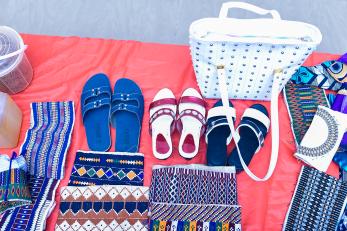
He added that it was important to ride on the support of government agencies with youth empowerment within their mandates, such as the National Directorate of Employment (NDE) and Youth Empowerment and Social Support Operations – (YESSO). He also stated that with funding from the EU, the program was able to support the Ministry of Women Affairs, BEST Center Damaturu, and NDE vocational training centers with vocational training equipment.
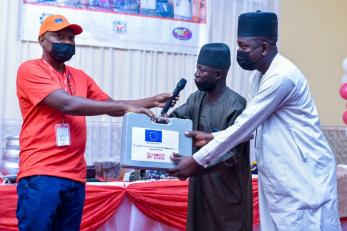
“The BRICC program has impacted the zeal and the spirit of self-reliance on the vulnerable persons in Yobe state through its various programs. The program has also opened the horizon of the rural and vulnerable populace in need of investment in human development. The services rendered by BRICC to the vulnerable persons in Yobe State have contributed significantly in reducing the high level of poverty among victims of insurgency in the State,” said John Tumba Kwaji, State Coordinator, NDE Yobe State.
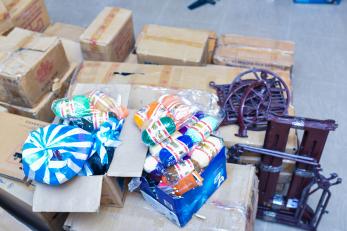
Many of the graduated youths have expressed their deep appreciation for the intervention, and the kind support provided by the EU. “I had always wanted to learn tailoring but did not get the opportunity and support. During my training, I was really dedicated and made the place my home and attended even weekends. I am grateful to Mercy Corps as with the grant I received, I am able to set up,” said Dauda, who got trained and received a business grant.
The EU BRICC program is a consortium-led recovery initiative, implemented by Mercy Corps Nigeria, Cooperazione Internazionale (COOPI), and Danish Refugee Council (DRC). In addition to the youth initiative, the program provides cash and food assistance, access to financial aid, agricultural support, and community involvement in governance.
Thoughts from the graduates
I am grateful to Mercy Corps and EU, my three younger sisters can now make caps.
Fatima Muhammed, Gwange
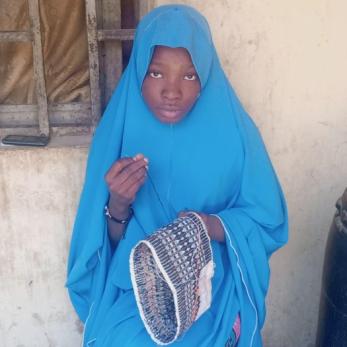
Fatima Muhammed was an orphan who dropped out of school after the death of her father. In Gwange, living with her mother and a family of 12, life became hard when they lost their father. She learned cap-making through vocational skills training. She can now make caps which she sells and supports her family with. With the little she earned in cap-making, she was able to support her younger one’s schooling. She also trains them on cap making to enhance the economy of the family.
I would’ve been a truck conductor, but now I stay close to my parents, helping them.
Adamu Haruna, Nayinawa community
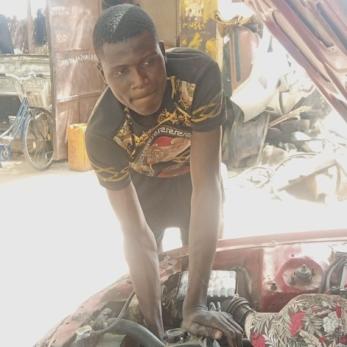
20 years old Adamu Haruna is from the Nayinawa community. He was not attending school but had an ambition of becoming a panel beater. He would go to the nearby garages (mechanics workshops) every morning, hoping to learn mechanical skills. Adamu was one of those selected to learn automobile panel beating works under the vocational training program.
People in my community look up to me, as I sell bags during weddings and naming ceremonies.
Hauwa Mohammed, Hausari in Geidam
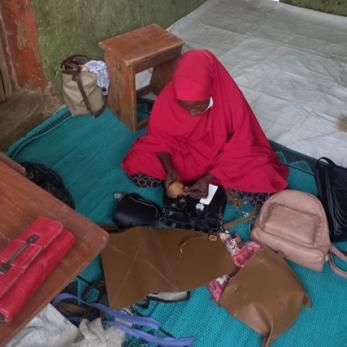
Hauwa Mohammed, 20 years, from Hausari in Geidam is the fourth of nine children. Having lost her father during the insurgency, the burden was much on her mother. Through COOPI, one of Mercy Corps’ BRICC consortium partners, she enrolled in vocational skill training and now makes and sells bags in her community.